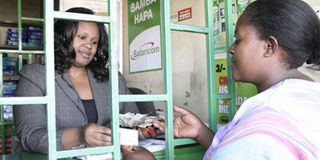New e-currency now available to M-Pesa users

PHOTO | PHOEBE OKALL | FILE A mobile money transfer shop in Kangemi near Nairobi. Two firms, Kipochi and LocalBitcoins, have announced that M-Pesa users can now purchase and trade in Bitcoins from their phones.
What you need to know:
- Although the Bitcoin has been around since 2009, it has remained difficult for Kenyans to access due to technological challenges
- Currently, Bitcoin can be directly purchased using one of 15 global currencies. Given its meteoric rise, countries across the world have been grappling with its regulation
A storm of interest raised by a digital currency across the globe has hit Kenya as it now possible to acquire the currency on a local mobile cash transfer platform.
Two firms, Kipochi and LocalBitcoins, have over the last two weeks announced that M-Pesa users can now purchase and trade in Bitcoins from their phones.
Although the Bitcoin has been around since 2009, it has remained difficult for Kenyans to access due to technological challenges. Both Kipochi and LocalBitcoins hope to tap into the already vibrant mobile money market to grow the use of Bitcoin locally.
“We are putting special focus on Kenya as it is a world-renowned market leader in mobile money,” said Kipochi chief technology officer Pelle Braendgaard.
Bitcoin is a digital currency that is independent of the banking systems or regulation by any government authority. Mathematical formulas are used in its creation and its management. It can be transferred through computers or phones.
Kipochi is a United Kingdom-based company that has partnered with a local company registered as an M-Pesa merchant to allow Kenyans to purchase Bitcoins. LocalBitcoins, on the other hand, has added an M-Pesa option to its marketplace and is currently looking for traders in Tanzania and Kenya.
Both firms say that making it possible to buy Bitcoins via M-Pesa will make it easier for Kenyans to send money across borders and to purchase items on the Internet.
However, the launch of these two Bitcoin wallets into the local market means that Kenya has now joined the heated global debate on the regulatory framework surrounding the digital currency.
Bitcoin has a peculiar history. For one, the founder of Bitcoin remains anonymous. The concept was first mooted in a 2008 paper published under the pseudonym Satoshi Nakamoto. Satoshi Nakamoto disappeared as an online presence in 2010 but not before he had expressed a disapproval of the global banking system. Bitcoin was created expressly as a currency beyond the purview of banks and governments.
Currently, Bitcoin can be directly purchased using one of 15 global currencies. Given its meteoric rise, countries across the world have been grappling with its regulation.
Additionally, there are fears that Bitcoin could easily be used for money laundering or to fund criminal activities.
Although Bitcoin transactions can be publicly verified, it can be difficult to ascertain the real-life identity of the parties involved in the transaction.
“Unless something is legal tender, it does not fall within our mandate. Every sovereign state issues its own currency. Unless this currency is legal tender, we cannot really start talking about money laundering,” said Mr Jackson Kitili who currently heads Kenya’s Financial Reporting Centre (FRC).
The FRC is an independent government body mandated to combat money laundering under the Proceeds of Crime and Money Laundering Act. In Kenya, the Central Bank of Kenya has the mandate to regulate the creation and use of all currency or legal tender in the market. The Central Bank Act defines legal tender as notes and coins issued solely by the CBK.




